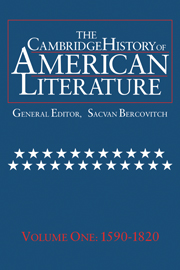Book contents
- Frontmatter
- Introduction
- THE LITERATURE OF COLONIZATION
- NEW ENGLAND PURITAN LITERATURE
- 1 The Language of Salem Witchcraft
- 2 The Dream of a Christian Utopia
- 3 Personal Narrative and History
- 4 Poetry
- 5 The Jeremiad
- 6 Reason and Revivalism
- BRITISH-AMERICAN BELLES LETTRES
- THE AMERICAN ENLIGHTENMENT, 1750–1820
- THE LITERATURE OF THE REVOLUTIONARY AND EARLY NATIONAL PERIODS
- Chronology
- Bibliography
- Index
4 - Poetry
from NEW ENGLAND PURITAN LITERATURE
Published online by Cambridge University Press: 28 March 2008
- Frontmatter
- Introduction
- THE LITERATURE OF COLONIZATION
- NEW ENGLAND PURITAN LITERATURE
- 1 The Language of Salem Witchcraft
- 2 The Dream of a Christian Utopia
- 3 Personal Narrative and History
- 4 Poetry
- 5 The Jeremiad
- 6 Reason and Revivalism
- BRITISH-AMERICAN BELLES LETTRES
- THE AMERICAN ENLIGHTENMENT, 1750–1820
- THE LITERATURE OF THE REVOLUTIONARY AND EARLY NATIONAL PERIODS
- Chronology
- Bibliography
- Index
Summary
Because the New England Puritans radically distrusted the senses and the imagination and were highly suspicious of all forms of art, most literary scholars either have ignored their poems or have treated them as curiosities. The advocates of Anne Bradstreet continue to construct an image of her as a cultural rebel who produced poetry in spite of the religious and social forces against her as a woman and as a Puritan. Similarly, when the poems of Edward Taylor were discovered and published in the late 1930s, many literary historians explained that his self-conscious artistry violated Puritan doctrines and that his poetic impulses suggested that he was by temperament more Catholic or Anglican than Puritan. The long disappearance of his work prompted a conclusion that he had feared exposure of his artistry and thereby enjoined his heirs to suppress his poetry. Not only, in this view, did theology prevail against Puritan art but the harsh physical conditions of New England life left no time for aesthetic indulgences. Bradstreet's productions were attributed to the leisure available to a woman of her high social standing and Taylor's to the quiet life in his wilderness parish of Westfield, Massachusetts.
To be sure, there are many valid historical reasons for assuming the term “Puritan poetry” to be an oxymoron. In England from the late sixteenth century, Puritan theologians and ministers had warned that the senses were unreliable, that appeals to the imagination were dangerous, and that the use of figurative, imagistic, or symbolic language bordered upon idolatry. Reasoning that God had inscribed all the truth that humanity needed in the scriptures, they held that plain and direct discussion of His word was the only truly legitimate and humble mode of verbal expression.
- Type
- Chapter
- Information
- The Cambridge History of American Literature , pp. 226 - 254Publisher: Cambridge University PressPrint publication year: 1994

